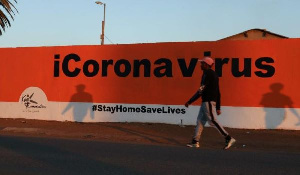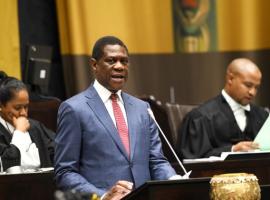
A man walks past the words “Coronavirus” painted on a wall
PRETORIA, June 8 (NNN-AGENCIES) — The South African government has agreed how much it will pay private hospitals and medical practitioners to treat severely ill COVID-19 patients if public hospitals run out of space, a senior health official said.
The government has been in talks for months with private firms and medical associations ahead of a probable scenario where public hospitals run out of critical care beds.
Agreement has been reached on a daily fee of up to 16,000 rand ($950) for COVID-19 patients that get treated in critical care beds in private hospitals, said Anban Pillay, the health ministry’s deputy director-general for national health insurance.
The fee includes the cost of using the bed, paying a team of specialists to treat the patient and additional services including pathology and radiology.
Now that high-level terms have been agreed with the private sector, health departments in the country’s nine provinces will sign “service-level” agreements, Pillay said.
Estimates vary widely as to how many critical care beds there are in the country.
A ministry presentation in April put the total at around 3,300, with two-thirds of those in the private sector. Healthcare provider Netcare estimates there are some 6,000 beds, with around 3,800 in private hospitals.
South Africa had recorded 45,973 cases of the new coronavirus as of Saturday, the most in Africa, with the number rising more steeply in recent weeks.
As of late May, around 1,100 COVID-19 patients were hospitalised, but it is not clear how many were in critical care.
Pillay said he expected the Western Cape provincial health department would use critical care beds in private hospitals soon, followed by the Eastern Cape. The Western Cape accounts for 66% of the country’s cases and the Eastern Cape 12%.
“Given the situation in the Western Cape it was important we close this matter,” Pillay said. — NNN-AGENCIES





